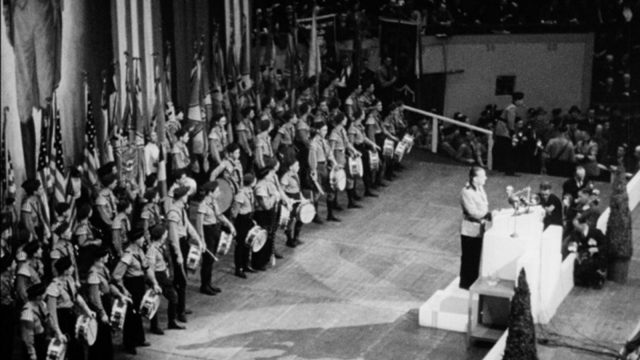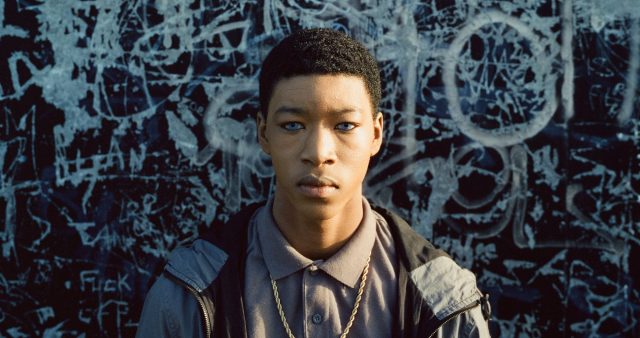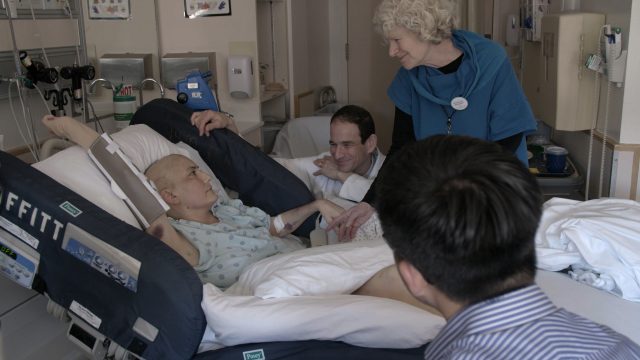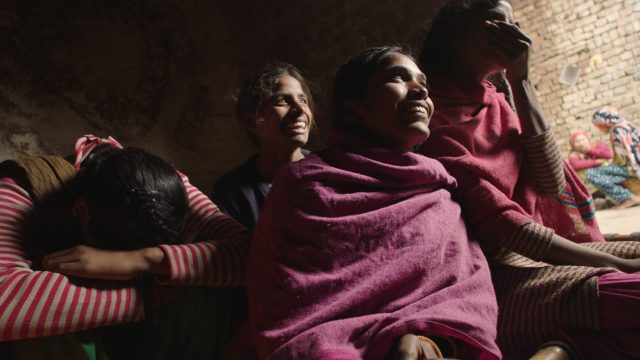The 2019 Oscar-Nominated Documentary Shorts: Politics and Periods, by Alexander Miller

A Night at the Garden
Short, and sweet? Clocking in at a slim seven minutes, Michael Curry’s documentary is solely composed of archival footage shot at Madison Square Garden on February 20th, 1939. There’s a crowded street. Mounted police officers are containing a crowd. Mist envelopes their imposing presence. The marquee reads, “To Night Pro American Rally” (The Rangers would play Detroit Tuesday night). The iconic venue is packed. The crowd is exploding with enthusiasm. Who could be performing? What’s the attraction? Well, it’s the Nazi party, specifically the German American Bund, who, at the time, were led by Fritz Kuhn. Legions of people are raising their arms and “sieg heil”-ing in salute. Swastikas adorn the stage alongside images of George Washington. The footage is plain. There’s no narration or talking heads. The presentation of the material is the documentary. It speaks for itself and, as an historical document, the unadorned film is jarring. Curry’s instincts yield a shockingly prescient portrait of the past and, in doing so, makes us think of the state of affairs as they are today.
Curry’s film can be seen on Vimeo here.

Black Sheep
A deeply personal account told by Cornelius Walker, who recounts the events that happened when his family moved from London to Essex after the Damilola Taylor killing. Walker realizes immediately that his new neighborhood is run by racist gangs. After abuse and violent encounters, Cornelius begins to resent the color of his skin and, in order to survive and fit in with his new surroundings, lightens his complexion, dons blue contact lenses, affects the local accents and befriends the intolerant locals.
Director Ed Perkins opts for a more dramatic approach by incorporating footage of Walker, framed in what feel like deliberately intimate close up compositions, alongside artful dramatic recreations. “Black Sheep” echoes Errol Morris in its structure and color palette and tells a poignant, personal story regarding race, race shaming, bullying and coming of age. Real-life stories of racial prejudice in non-fiction filmmaking are usually inspired by large scale cultural phenomena (slavery, segregation, other awful things) but this individual story emphasizes the gravity of racial prejudice by delving into the psychological tumult of one person.

End Game
Rob Epstein and Jeffrey Friedman’s “End Game” focuses on terminally ill patients at a San Franciscan hospital as well as the Zen Hospice Project and the doctors providing care for them. While the practitioners apply medicinal aid, there’s an emphasis on the more psychological and existential nature of mortality and coming to terms with the inevitability of death. The juxtaposition of these two contrasting themes is fascinating but “End Game” gets derailed when it bites off more than it can chew. The entirety of its run time feels like a series of introductions to various people and occasionally their families. The insights and bits of personal urgency resonate but the film is a bit rigid. It’s like shaking the hands of a room full of people while someone’s pushing you to the door.
The patients and their plights are intimately rendered and the footage Epstein and Friedman capture is affecting but the film skitters from person-to-person too frequently to establish a substantial connection. “End Game” is at its strongest when the cameras are turned to Dr. BJ Miller, the palliative care specialist whose mission statement regarding the Zen Hospice Project is both illuminating and inspiring. However, the documentary relegates this portion of the film to the back burner. Perhaps there isn’t a thematic resolution as “End Game” is exploring reconciliation and confronting death but, as a documentary, it feels like Netflix is trying to capitalize on the Oscar-winning documentary short from last year, Heroin(e), with another human interest story but this time around they missed the mark.

Lifeboat
The 2016 short documentary subject category featured a title, “4.1 Miles,” about a Greek coast guard captain aiding the profuse number refugees struggling at sea to find a better life. The short felt like a companion to the 2016 feature documentary Fire at Sea. Now we have “Lifeboat,” another documentary about the insurmountable number of people risking death to flee their native lands of oppression and the volunteers who dedicate their time and resources to rescuing them. Skye Fitzgerald’s direction is tight and determined. The camerawork is fearless, taking us into the cramped spaces and dire conditions of the cobbled together refugee vessels and skillfully tracking survivors docking rescue boats. “Lifeboat” also takes time to clock some one-on-one interviews with survivors and volunteers. The matter-of-fact delivery recounting the atrocities these people have endured highlights the urgency of their plight. The number of documentaries stemming from the worldwide refugee epidemic seems to have grown in recent years. The distressing element of these works is that they can’t offer a solution but merely record the painful occurrences with the hopes that it will provide more understanding to the matter as a whole.

Period. End of Sentence.
In the documentary short subject category, you can always count on one title to stray from the territory of obligatory topical gut-wrenching subjects. You know, the refugee crisis, racism, politics, etc. But, for my money, it’s the titles that go off the radar and turn us on to something new that feel the most impactful. Rayka Zehtabchi’s “Period. End of Sentence.” has the most focused narrative, unique story and fascinating subjects and it’s delivered with a punchy aesthetic and breezy delivery. As a means to promote safe, feminine hygiene, as well as destigmatize menstruation, local woman volunteer to assist in manufacturing, selling and distributing low-cost, environmentally friendly absorbent pads. Due to the cultural atmosphere, there’s still an air of shame regarding menstruation. In sometimes comedic and otherwise telling diversions, the filmmakers turn their camera to interview various locals, asking questions like, “What’s a period?” Some guys struggle to answer the question, replying with, “Isn’t that like a class in high school?” Even those who know the answer to something as natural as a menstrual cycle can’t bring themselves to provide a sincere response. They play dumb or just ignore the work that’s being done.
The construction of a compelling documentary comes from the material that inspires it. This story shines a light on a culturally relevant disconnect, that simultaneously parallels universal stigma surrounding women’s reproductive rights and the marginalization that continues, even in otherwise “progressive” countries such as the US. Zehtabchi’s accomplished directorial effort will hopefully lead to more absorbing material down the road. Even so, this entry is an achievement and is without a doubt the most engaging title in this year’s short documentary category. Long story short, I hope this one wins, period.


























